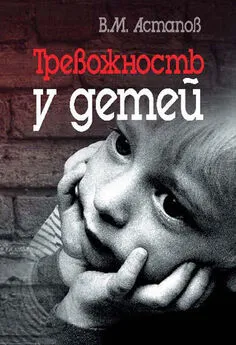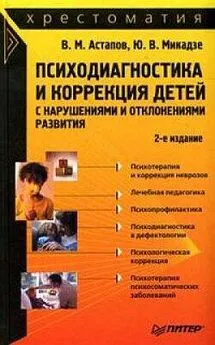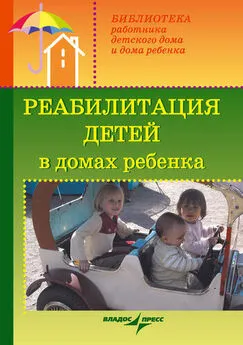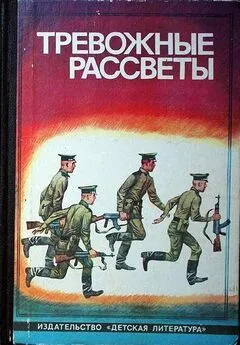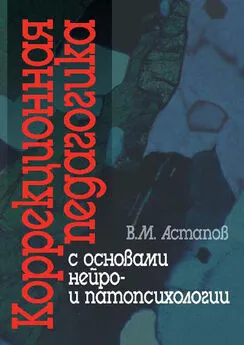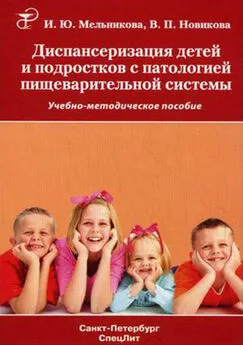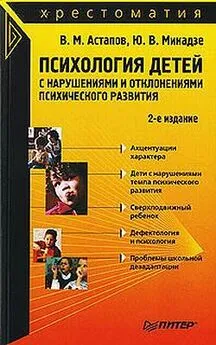Валерий Астапов - Тревожность у детей
- Название:Тревожность у детей
- Автор:
- Жанр:
- Издательство:Литагент «Когито-Центр»881f530e-013a-102c-99a2-0288a49f2f10
- Год:2008
- Город:Москва
- ISBN:978-5-9292-0169-1
- Рейтинг:
- Избранное:Добавить в избранное
-
Отзывы:
-
Ваша оценка:
Валерий Астапов - Тревожность у детей краткое содержание
Книга посвящена анализу места и роли тревоги в аффективных и поведенческих расстройствах у детей. Рассмотрены теоретические вопросы, касающиеся источников, причин и особенностей проявлений тревоги в детском возрасте, а также анализируются клинические и научные исследования тревожных расстройств, представленных в международных классификациях болезней. Предлагаются некоторые способы преодоления тревоги.
Книга рассчитана на практических и медицинских психологов, а также будет полезна детским врачам-психоневрологам и психотерапевтам.
Тревожность у детей - читать онлайн бесплатно ознакомительный отрывок
Интервал:
Закладка:
В заключении необходимо отметить, что использование техники АМТ в больших группах неэффективно.
Литература
1. Блюм Г. Психоаналитические теории личности – М.: КСП, 1996.
2. Дельгадо Х. Мозг и сознание. – М., 1971.
3. Джемс У. Психология. – М.: Педагогика, 1991.
4. Кемпинский А. Экзистенциальная психиатрия. – М.: Изд-во «Совершенство», 1998.
5. Кьеркегор С. Страх и трепет: Пер. с дат. – М.: Республика, 1993.
6. Лазарус Р. Теория стресса и психофизиологические исследования. – В сб.: Эмоциональный стресс. – Л.: Медицина, 1970.
7. Марсон П. 25 ключевых книг по психоанализу: Пер. с фр. – Челябинск: «Урал LTD», 1999.
8. Раттер М. Помощь трудным детям: Пер. с англ./ Общ. ред. А.С. Спиваковской. – М.: Прогресс, 1987.
9. Рейковский Я. Экспериментальная психология эмоций. – М.: Прогресс, 1972.
10. Рикфорт Ч. Критический словарь психоанализа – СПб., 1995.
11. Роджерс К. Взгляд на психотерапию: Становление человека. – М.: Прогресс-Универс, 1994.
12. Стреляу Я. Роль темперамента в психическом развитии. – М.: Прогресс, 1982.
13. Тиллих П. Теология культуры. Пер. с англ. – М.: Юрист, 1995, 479с.
14. Фрейд А. Психология «Я» и защитные механизмы. – М., Педагогика, 1993.
15. Фрейд А. Теория и практика детского психоанализа. Пер. с англ. – М.: Апрель-Пресс. Издательство ЭКСМО-Пресс, 1999.
16. Фрейд З. Введение в психоанализ: Лекции. – М.: Наука, 1989.
17. Фромм Э. Анатомия человеческой деструктивности: Перевод – М.: Республика, 1994.
18. Хекхаузен Х. Мотивация и деятельность. Т.1 – М.: Педагогика, 1986.
19. Хорни К. Невротическая личность нашего времени; Самоанализ: пер. с англ. – М., Изд. группа «Прогресс» – «Универс», 1993.
20. Эриксон Э. Детство и общество. – СПб., 1996.
21. Юнг К. Архетип и символ. – М.: Ренессанс, 1991.
22. Юнг К. Собрание сочинений. Конфликты детской души. Пер. с нем. – М.: Канон, 1997.
23. Abramson L., Alloy L., Metalsky G. The cognitive diathesis – stress theories of depression: Toward and adequate evaluation of the theories’ validities. – In: L.Alloy (Ed.), Cognitive processes in depression. New York, 1988, pp. 3-30.
24. Achenbach T. Integrative guide for the 1991 CBCL/4-18, YSR, and TRF profiles. University of Vermont, 1991.
25. Achenbach T. The child behavior profile: I. Boys aged 6-11. – J. Consulting and Clinical Psychology, 1978, Vol. 46, pp. 478–488.
26. Achenbach T., Connors G., Quay H. e.a. Replication of empirically derived syndromes as a basis for taxonomy child/adolescent psychopathology. – J. of Abnorm. Child Psychol., 1989, Vol. 17, pp. 299–323.
27. Achenbach T., Edelbrock C. The child behavior profile: II. Boys aged 12–16 and girls aged 6-11 and 12–16. – J. Consulting and Clinical Psychology, 1979, Vol. 47, pp. 223–233.
28. Achenbach T., Howell C., Quay H., Conners C. National survey of competencies and problems among 4 to 16 year-olds: Parent’s reports for normative and clinical samples. – In: Monographs of the Society for Research in Child Development, 1991.
29. Ackerson L. Children’s behavior problems. Chicago University, 1931.
30. Ainsworth M. Individual Differences in strange-situation behavior of one year olds. In: H. Schaffer (Ed.), The Origins of Human Social Relations. Academic Press, London-New York, 1971, p.145.
31. Alder A. Uber den nervosen Charakter. Munchen, 1928.
32. Alloy L., Kelly K., Mineka S., Clements. Comorbidity of anxiety and depression disorders: A helplessness – hopelessness perspective. – In: J.Maser, C. Cloninger (Eds). Comorbidity of mood and anxiety disorders. Washington, 1990.
33. Allport G. Pattern and Growth in Personality. N-Y: Holt, Rinehart and Winston, 1961.
34. Allport G. The Individual and His Religion. New York: Macmillan, 1970.
35. Anthony S. The Discovery of Death in Childhood and After. Allen Cane, London, 1971.
36. Arnold M. Stress and Emotion. In: Psychological Stress – New York, 1967, pp. 123–130.
37. Ayllon T., Smith D., Rogers M. Behavioral management of school phobia. – J. Behav. Ther. Psychiatry, 1970, Vol. 1, pp. 125–138.
38. Bandura A. Social Learning Theory. Prentice-Hall, Englewood Cliff, New York, 1977.
39. Bandura A., Menlove F. Factors determining vicarious extinction of avoidance behavior through symbolic modeling. – J. Pern. and Soc. Psych., 1968, Vol. 5, pp. 16–23.
40. Barlow D. Anxiety and its disorders: The nature and treatment of anxiety and panic. New York, 1988.
41. Barrat E. Anxiety and impulsiveness: Towards a neuropsychological model. In Anxiety: Current Trends in Theory and Research / Ed. Ch. Spielberger – Vol. 1, New York – London, 1972, pp.195–222.
42. Basowitz H., Persky H., Korchin S. and Grinker R. Anxiety and Stress. New York: McGraw-Hill, 1955.
43. Basowitz M. Anxiety and stress. New York, 1955, 278 p.
44. Basowitz M., Persky H., Korchin S., Grinker R. Anxiety and stress. An Interdisciplinary Study of life situations – New York, 1955, pp.85 – 109.
45. Basselman B. Neurosis and psychosis. 3-ed., Springfield, 1964, pp. 11–13.
46. Beck A. Cognition, anxiety and psychophysiological disorders – In: Anxiety. Current trends in theory and research. Vol.2/ Ed. Ch.Spielberger – New York – London, 1972, p.343.
47. Beck A., Emery G. Anxiety disorders and phobias: A cognitive perspective. New York, 1985.
48. Beck A., Stewart B., Clark L. Cognitive specificity and positive-negative affectivity: Complementary or contradictory views on anxiety and depression? – J. of Abnorm. Psychology, 1990, Vol. 99, pp. 148–155.
49. Beidel D., Neal A., Lederer A. The feasibility and validity of a daily diary for the assessment of anxiety in children. – J. Behavior Therapy, 1991, Vol. 22, pp. 505–517.
50. Bender L. Anxiety in Disturbed Children. In Hoch, Paul H., and Zubin J. (Eds), Anxiety. N-Y, 1950.
51. Berge A. L’enfant an caractere dificile. Paris, Libraire Hachette, 1970.
52. Bieber I. A Concept of Psychopathology. Current Approaches to Psychoanalysis. Hoch P. and Zubin J. (Eds) – N-Y, 1960.
53. Blagg N. School phobia and its treatment. London, 1987.
54. Blan A., Huse W. Anxiety (“actual”) neuroses as a cause of behavior disorders. – Amer. J. Orthopsychiat, vol. 26, p.108, 1956.
55. Blau A. A unitary hypothesis of emotion: Anxiety, emotions of displeasure and affective disorders – J. Psychoanal. Quart, vol. 24, 1955, p.75.
56. Blumberg S., Izard C. Discriminating patterns of emotions in 10– and 11-year-old children’s anxiety and depression. – J. Personality and Social Psychology, 1986, Vol. 51, pp. 852–857.
57. Borkovec T., Hu S. The effect of worry on cardiovascular response to phobic image – J. Behav. Res. Ther., 1990, vol. 28, pp. 69–73.
58. Bower T. Development in Infancy. Freeman, San Francisco, 1974.
59. Bowlby J. Attachment and Loss Separation: Anxiety and Anger. New York, 1975, Vol. 11, pp. 454–489.
60. Bowlby J. Psychopathology of anxiety: The role of affectional bonds. In: M.Cader (Ed). Studies in Anxiety. R.M.P.A. Headley. Kent, 1969, pp. 96-108.
61. Bowlby J. Separation anxiety – Int. J. Psychoanal., 1960,vol. 41, p.89.
62. Bowlby J. The nature of the child’s tie to his mother. – Int. J. Psychoanal., 1951, Vol. 39, pp. 350–357.
63. Brown J. The motivation of behavior. New York: McGraw-Hill, 1950.
64. Brown T., Barlow D. Comorbidity among anxiety disorders: Implications for treatment and DSM-IY. – J. of Cons. and Clin. Psychology, 1992, Vol. 60, pp. 835–844.
65. Buss A. Two anxiety factors in psychiatric patients. – J. Abn. Soc. Psychol., 1962, vol. 62, p.426.
66. Campos J., Emde R., Gaenbauer T. and Henderson C. Cardiac and behavioral interrelationships in the reactions of infants to strangers. – J. Devel. Psychol., 1975, vol. 11, p. 589–601.
67. Cannon W. The James-Lange theory of emotion: A critical examination and an alternative theory. – Am. J. Psychol., 1927, Vol. 39, pp. 106–124.
68. Carron A. Reactions to “anxiety and motor behavior” – Journal of Motor Behav., 1971, Vol. 2, pp. 181–188.
69. Castaneda A., McCandless B., Palmero D. The children’s form of the Manifest Anxiety Scale. – J. Child Development, 1956, Vol. 16, pp. 317–326.
70. Cattell R. Anxiety and motivation: theory and critical experiments – In: Anxiety and behavior / Ed. Ch. Spielberger. New York – London, 1966, p.23.
71. Cattell R. Psychological definition and measurement of anxiety. – J. Neuropsychiat, 1964, vol.5, p.396.
72. Cattell R., Scheier I. The meaning and measurement of neuroticism and anxiety, New York: The Roland Press Company, 1961, p.2.
73. Clark D., Beck A. Cognitive theory and therapy of anxiety and depression. -In: P Kendall and D. Watson (Eds), Anxiety and depression: Distinctive and overlapping features. – San Diego, 1989, pp. 379–411.
74. Clark L. The anxiety and depressive disorders: Descriptive psychopathology and differential diagnosis. – In: P Kendall and D. Watson (Eds), Anxiety and depression: Distinctive and overlapping features. – San Diego, 1989, pp. 83-130.
75. Cloninger C. Anxiety and theories of emotions. – In: Handbook of Anxiety, Vol. 2, K. Noyes, M. Roth, G. Burrows (Eds), pp. 1-29, Amsterdam, 1988.
76. Costello A., Edelbrock C., Dulcan M., Kalas R., Klaric S. Report on the NIMN Diagnostic Interview Schedule for Children (DIS-C). Washington, National Institute for Mental Health, 1984.
77. Costello E., Angold A. – J. Amer. Acad. Child and Adolescent Psychiatry. 1988, Vol. 27, pp. 726–737.
78. Crosby J. Theories of Anxiety: a theoretical perspective – Am.J. Psychoanal., 1976, vol. 36, p.237.
79. Crowe R. The genetics of panic disorder and agoraphobia. – J. Psychiatric Developments, 1985, Vol. 2, pp. 171–186.
80. Dabrowski K. Spoleczno-wichowawcza psychiatrie dziecieca. Wyd. 2, Warczawa, PZWS, 1964.
81. De Ruiter, Rijken H., Garssen e.a. Comorbidity among the anxiety disorders. – J. of Anxiety Disorders, 1989, Vol. 3, pp. 57–68.
82. Dollard J., Miller N. Personality and psychotherapy. New York, McGraw-Hill, 1950.
83. Dowrick P. Self Modeling: A Videotape Training Technique for disturbed Children. University of Auckland, 1976.
84. Dowrick P. Suggestions for the use of edited video replay in training behavioral skills. – J. Practical Approaches to Dev. Handicap., 1978, Vol. 2, pp. 21–24.
Читать дальшеИнтервал:
Закладка:
